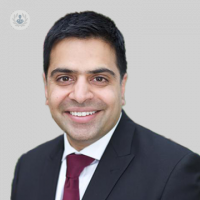What triggers fibromyalgia flare-ups?
Written in association with:Fibromyalgia is a chronic condition that affects millions of people, causing widespread pain, fatigue and a range of other symptoms. Those living with fibromyalgia often experience flare-ups, where symptoms become more severe or frequent.
Understanding what triggers these flare-ups is crucial for managing the condition and improving quality of life. Here to provide a detailed insight to this important topic is leading pain management specialist Dr Mohammed Qureshi.

What are the most common triggers of fibromyalgia flare-ups?
Stress
Stress is a significant trigger for many people with fibromyalgia. Both emotional and physical stress can exacerbate symptoms, leading to increased pain, fatigue and muscle tension. Managing stress through relaxation techniques, mindfulness, and adequate rest is essential in reducing the frequency of flare-ups.
Weather changes
Changes in weather, particularly cold or damp conditions, can trigger fibromyalgia symptoms. Many patients report increased pain and stiffness during colder months or when the weather shifts suddenly. While it’s not always possible to avoid these triggers, staying warm and practising gentle exercises can help manage symptoms.
Physical overexertion
Overdoing it physically, whether through exercise or daily activities, can lead to a flare-up. It’s important for those with fibromyalgia to find a balance between staying active and not pushing their bodies too hard. Gentle, regular exercise is recommended, but pacing oneself is key.
Lack of sleep
Poor sleep quality or insufficient sleep can worsen fibromyalgia symptoms. The condition itself often leads to disrupted sleep, creating a vicious cycle. Prioritising good sleep hygiene, such as establishing a regular bedtime routine and creating a restful environment, can help improve sleep and reduce flare-ups.
Dietary factors
Certain foods or dietary habits may trigger flare-ups in some people. While there is no specific fibromyalgia diet, some patients find that avoiding processed foods, sugar and caffeine can help manage their symptoms. Identifying potential dietary triggers by noting your intake in a food diary, can be helpful.
Hormonal changes
Hormonal fluctuations, such as those that occur during menstruation, pregnancy or menopause, can trigger fibromyalgia symptoms. Women with fibromyalgia often report increased pain and fatigue during these times. Consulting with a healthcare provider to manage hormonal changes may help reduce flare-ups.
How do you manage fibromyalgia flare-ups?
Understanding personal triggers is a critical step in managing fibromyalgia. It’s important for patients to work closely with their healthcare providers to develop a comprehensive management plan that may include medication, physical therapy, lifestyle changes and stress management techniques. By identifying and avoiding triggers, patients can better control their symptoms and improve their overall well-being.
Looking for expert treatment for fibromyalgia? Arrange a consultation with Dr Qureshi via his Top Doctors profile.


